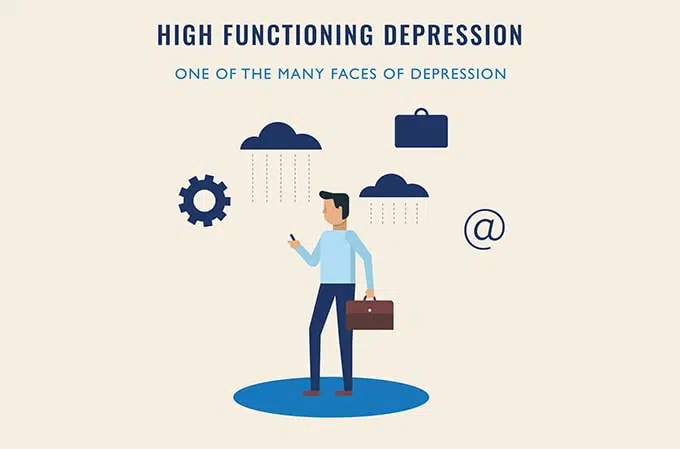What is High Functioning Depression?

Depression is a debilitating and serious mental health condition that affects millions of people. Mental health is a complex world. In some cases, a person may struggle internally but appear completely fine and functional to the outside world. High-functioning depression can often go undetected as, on the surface, an individual has a job, good family life, studies, or dresses well. Let’s discuss what exactly is high-functioning depression, the signs to look out for, and what you can do about it.
What is High Functioning Depression?
High-functioning depression is a colloquial term to describe hidden symptoms of depression. It’s not an official diagnosis term that clinicians use. High-functioning depression is better known as dysthymia or persistent depressive disorder (PDD). Dysthymia is a continuous and long-lasting form of depression.
In many cases, an individual will go to work, interact with people, and appear completely normal and fine to the outside world. The reality is that depression can sometimes be invisible to friends and family, making it more of a shock and taboo topic to bring up in conversation.
High-functioning depression and major depression share some similarities, but the individual may not experience the same classic symptoms of depression. That’s where it can get a little confusing.
Dysmithia, or PDD, is a low-level depression that’s not as severe as major depression but can last much longer. Yet, it’s a serious mental health condition and, in some cases, more disabling than major depression.
What are the Signs of High Functioning Depression?
Dr. Alexander Alvarado, Psy.D., Licensed Clinical Psychologist in New York, says, “one of the easiest signs to keep an eye out for is sleep. People with high-functioning depression tend to sleep either too much or may struggle with insomnia.”
Other signs of high functioning depression include:
- Lasting sad or anxious emotions
- Low self-esteem
- Trouble concentrating
- Irritability
- Low energy
Typically, high-functioning depression or persistent depressive disorder is hard to recognize. The problem is that depression is generally associated with behavior like struggling to get out of bed, withdrawing from friends and family, or being in a bad place to the point you can’t muster the strength to go to work. But, with high-functioning depression, stereotypical behavior associated with depression doesn’t always occur.
Because signs of high-functioning depression are usually more internal, it’s hard for a loved one to identify and recognize. Even people with the condition struggle to label how they feel and identify how they feel as signs of depression. As an individual may be living their life and functioning normally, the mental health condition is actually very misleading as it appears that someone may not even need help. But this really isn’t the case.
High-functioning depression or dysthymia may include fewer symptoms of major depression. But the symptoms that individuals do have last for more than two years.
What Does High-Functioning Depression Look Like?
On paper, certain symptoms and timelines outline the diagnostic criteria of what it means to experience persistent depressive disorder. However, that doesn’t necessarily explain what it could feel like to go through or how to know if you have high-functioning depression.
Here are some examples of what high-functioning depression could look like:
- You feel down most of the time, and friends may describe you as a downer or gloomy.
- You often feel tired even if you get a good night’s sleep or sleep too much.
- You can function at work or school but have trouble concentrating on tasks.
- You feel like you don’t deserve to be happy.
- It may appear like you’re lazy, but it takes a lot of energy to function normally.
- Your weight can change as you sometimes have no appetite or overeat without thinking.
- You may also feel hopeless or cry without reason.
- You may constantly criticize yourself, and it’s difficult to feel good about yourself.
It’s important to know that depression can look different in people. While there are symptoms and commonalities of depression and other mental health conditions, depression may not be obvious to those around you.
Individuals with high-functioning depression typically maintain everyday tasks, and in some cases, to an exceptional level. People with high-functioning depression may also have periods of major depression. Major depressive episodes make it very difficult to function at a high level.
Although individuals with high-functioning depression appear to operate at a normal level, the mental health condition presents a unique set of challenges. It can be harder to see that a person may need treatment. A person may not display their symptoms, yet they are stuck in a place where it’s difficult to maintain relationships. Friends and family may struggle to recognize the needs of someone with high-functioning depression, which is why it’s so important to talk about the different faces of depression.
How to Treat High Functioning Depression
Often, people with high-functioning depression get used to depressive symptoms or don’t recognize the signs. But, getting treatment as early as possible is important in recovery. Dr. Alexander Alvarado says, “there are many treatments that could help with high-functioning depression. Two of the top therapies would be Cognitive Behavioral Therapy and Acceptance and Commitment Therapy.”
Cognitive Behavioral Therapy
Cognitive behavioral therapy (CBT) is a talking therapy that aims to help you identify and shift thought patterns that contribute to unhelpful or negative behavior. CBT helps you find a new way of behaving by changing your thought patterns. Talking therapy is a treatment for a number of mental health conditions, including anxiety and work stress.
When using CBT to help depression, your therapist will help to uncover those unhealthy thought patterns and replace them with more positive thoughts that you can apply to real life. CBT has been proven to be effective in treating mild to moderate levels of depression.
Acceptance and Commitment Therapy
Acceptance and commitment therapy (ACT) encourages individuals to accept how they feel instead of fighting their emotions. It helps you to focus on the present moment and accept your thoughts and feelings without judgment. The aim of ACT isn’t to eliminate difficult feelings but to be present with the way you feel without judgment. ACT is used to treat a range of mental health conditions, including depression, OCD, and anxiety.
Support Groups
Support groups allow individuals to talk about their experiences and offer encouragement to others going through the same thing. These types of groups may be more suitable for those already going through treatment for depression from a mental health professional. It can also be useful to share your struggles with those who understand what you’re going through.
Treatment for high-functioning depression is a process. It takes time. While this type of depression may not be as severe as major depression, it still majorly impacts your ability to enjoy life to the fullest. No one should have to live with constant sleep issues and low mood. High-functioning depression can be treated and although it will take time, getting help is an essential step toward a more positive outlook.
If you’re struggling with high-functioning depression or worried about a loved one, call our offices or schedule an appointment. We have a team of psychologists who can help put you on the right path and get the treatment you need. You can visit us in person or through teletherapy.

Sustaining Love: What to Do When the Honeymoon Phase Fades
There’s nothing quite like that initial attraction and spark where you just can’t get enough of your partner. But as the months and years roll on, it’s normal for relationships to transition through stages, and dynamics can shift.

All a Bad Dream? 1 in 4 Think Their Nightmares Predicted the Future
Americans have a lot on their minds. From navigating daily stress due to work or mental health to grappling with bigger widespread issues like politics, climate change, or crime, it’s safe to say there’s a lot to think about daily. For many, stressors aren’t only encroaching on their minds during waking hours, but also when they try to sleep in the form of nightmares, or bad dreams.

Psychological Challenges with Remote Working
While we can meet our loved ones in person without masks, the pandemic brought some changes that have stuck. Remote working has transformed the workforce. Some companies have chosen a fully remote approach, while others are welcoming their employees back to the office full-time.

Survey: 72% of Americans are Stressing About the Upcoming Presidential Election
Political viewpoints in the U.S. have always been contentious, but is the impact of politics in the United States making it difficult for people to live their everyday lives? With some anticipating another brutal and long campaign season ahead of the upcoming 2024 presidential election, nearly half of Americans say politics is negatively impacting their mental health.




